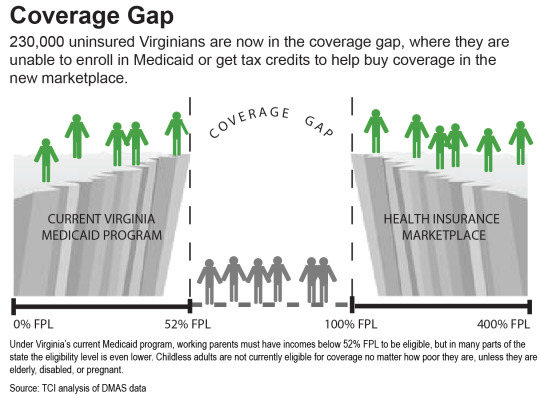January 5, 2016
New Year Brings New Opportunity
For 230,000 Virginians 2016 brings a new year but an old problem. For them it is the now annual reminder that they lack quality, affordable health care because state lawmakers insist on putting politics ahead of people. January 1 marked the two-year anniversary of what was supposed to be the expansion of Medicaid under the Affordable Care Act. Virginia’s lawmakers refused to close the coverage gap then, and they’ve continued to refuse with each passing year.

Virginia makes it very difficult for adults with children to get Medicaid and the peace of mind it would bring. For example, working parents in a family of three only qualify if they make less than about $10,500 a year, and that’s only if they live in the most expensive parts of the state, like Fairfax County. In some areas the income limit is as low as $6,700. And people without kids are aren’t eligible for Medicaid in Virginia no matter how little they make.
At the same time, a family of three must make at least $20,090 a year to get federal tax credits to buy health insurance through the Marketplace. That gap leaves 230,000 Virginians without affordable health care because their incomes – though very low – exceed the eligibility limit under Virginia’s stingy Medicaid and yet are too low for Marketplace tax credits.
The decision not to expand Medicaid isn’t just bad for people’s health; it hurts Virginia’s economy too. Over the past two years, Virginia has foregone more than $3 billion in federal money that would have paid the cost of covering people under the new program. Virginia is also forfeiting the economic benefits of thousands of well-paying jobs and the tax revenue those jobs would generate. And with just about half of Virginia’s rural hospitals operating in the red, those funds and jobs would have been crucial to promoting health care access across the state.
Fortunately, Governor McAuliffe’s proposed budget for the next two years includes language that could close the coverage gap. Furthermore, since federal funds would pay for many services currently paid for by the state, closing the gap could save as much as $352 million over the next two years that could be invested in the building blocks of a prosperous economy, everything from public education to safe communities.
It’s not too late to make a New Year’s resolution for 2016: let’s not let another year go by without closing Virginia’s coverage gap.
–Aaron Williams, Research Assistant
